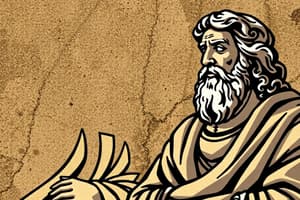Podcast
Questions and Answers
What does the appeal to tradition fallacy imply about an idea?
What does the appeal to tradition fallacy imply about an idea?
- It is acceptable because it has been true for a long time. (correct)
- It results from recent evidence.
- It is only valid if proven scientifically.
- It is based on random beliefs.
What does confirmation bias lead individuals to do?
What does confirmation bias lead individuals to do?
- Dig deeper into opposing viewpoints.
- Seek a balanced view of all information.
- Reject ideas that fit their beliefs.
- Readily accept information that aligns with their views. (correct)
Which of the following describes the fallacy of division?
Which of the following describes the fallacy of division?
- Connecting unrelated events through perceived causation.
- Assuming parts have the same qualities as the whole. (correct)
- Judging actions without considering external influences.
- Analyzing situations based on historical outcomes.
What is 'framing' in the context of cognitive biases?
What is 'framing' in the context of cognitive biases?
What characterizes correspondence bias or attribution effect?
What characterizes correspondence bias or attribution effect?
How does cultural bias influence analysis?
How does cultural bias influence analysis?
How does Aristotle's perspective on the body and soul differ from Plato's?
How does Aristotle's perspective on the body and soul differ from Plato's?
What defines the concept of 'personhood'?
What defines the concept of 'personhood'?
What do the terms 'philos' and 'sophia' signify in philosophy?
What do the terms 'philos' and 'sophia' signify in philosophy?
Which perspective allows viewing things objectively as a whole?
Which perspective allows viewing things objectively as a whole?
What role does philosophy play in the development of an individual?
What role does philosophy play in the development of an individual?
What type of truth is justified through data gathered from careful observation?
What type of truth is justified through data gathered from careful observation?
How long does it typically take to justify personal truth compared to other types?
How long does it typically take to justify personal truth compared to other types?
What is defined as a defect in an argument?
What is defined as a defect in an argument?
What is the purpose of logic within philosophy?
What is the purpose of logic within philosophy?
Which fallacy involves attacking the individual presenting an argument instead of the argument itself?
Which fallacy involves attacking the individual presenting an argument instead of the argument itself?
What does the term 'embodied spirit' refer to in the context of human persons?
What does the term 'embodied spirit' refer to in the context of human persons?
According to Descartes, what is the nature of the mind in relation to the body?
According to Descartes, what is the nature of the mind in relation to the body?
Which method of philosophizing is primarily concerned with examining the validity and coherence of arguments?
Which method of philosophizing is primarily concerned with examining the validity and coherence of arguments?
What does transcendence mean in the context of human persons?
What does transcendence mean in the context of human persons?
What is the primary focus of phenomenology as a method of philosophizing?
What is the primary focus of phenomenology as a method of philosophizing?
Which method of philosophizing challenges the idea that words and concepts have stable meanings?
Which method of philosophizing challenges the idea that words and concepts have stable meanings?
What role does a public intellectual play in philosophy?
What role does a public intellectual play in philosophy?
Which method of philosophizing involves engaging with different ideas and arguments in an interactive manner?
Which method of philosophizing involves engaging with different ideas and arguments in an interactive manner?
Flashcards are hidden until you start studying
Study Notes
Introduction to Philosophy
- Derived from Greek words "philos" (love) and "sophia" (wisdom).
- Considered a science due to its systematic investigation of concepts like truth, goodness, and beauty.
- Employs human reasoning exclusively, avoiding external authority or faith.
Perspectives in Philosophy
- Holistic Perspective: Viewing things as a whole, encouraging objectivity.
- Partial Perspective: Observing things subjectively, based on personal viewpoint.
Importance of Philosophizing
- Cultivates a well-rounded individual, promoting cultural and intellectual development.
- Enhances abilities to synthesize, critique, systematize, and evaluate diverse knowledge.
Nature of Truth
- Philosophy is not the only source of truth.
- Scientific Truth: Based on objective data and observation.
- Norms/Values: Emerge from consensus about right and wrong, requiring longer justification.
- Personal Truth: The most complex to justify, reliant on individual experience.
- Truth is defined by justification processes, where one's inner thoughts align with outward claims.
Justification Process
- Essential to validate statements through rigorous reasoning and evidence.
- Develops through logical arguments, critical thinking, and analysis of claims.
Logic and Argumentation
- Logic studies the art of good argumentation.
- Arguments consist of sequential statements supporting a claim.
- Critical Thinking: Distinguishes between facts and opinions, encourages thorough consideration before judgment.
Common Logical Fallacies
- Ad Hominem: Attacking the person rather than the argument.
- Appeal to Pity: Using emotional manipulation to sway opinion.
- Appeal to Force: Threatening consequences to support a claim.
- Bandwagon Fallacy: Claiming something is true because many believe it.
- Appeal to Tradition: Asserting truth based on longstanding beliefs.
- Begging the Question: Assuming the truth of the matter without proof.
- Fallacies of Composition/Division: Misattributing properties of parts to wholes or vice versa.
Cognitive Biases
- Correspondence Bias: Evaluating personality based solely on actions, ignoring context.
- Confirmation Bias: Favoring information that aligns with preexisting beliefs.
- Framing: Highlighting one aspect of an issue while ignoring others.
- Hindsight Bias: Believing past events were predictable.
- Conflict of Interest: Having vested interests compromising objectivity.
- Cultural Bias: Judging events through one's cultural lens.
Distinctions in Human Terminology
- Man: Refers to the human race, synonymous with humanity or humankind.
- Human: Designates Homo sapiens sapiens or modern humans.
- Human Being: Differentiates humans from other animals.
- Person: A human recognized with rights and dignity.
- Personhood: The state of being recognized as a person.
- Human Nature: Traits that are unique to humans.
Philosophical Views on Body and Soul
- Plato: Proposed dualism; soul imprisoned in the body, liberated in death.
- Aristotle: Rejected dualism; emphasized the body-soul union as the whole individual.
- Descartes: Advocated mind-body dualism; asserted the essence of man lies beyond physical existence.
- Embodiment: Denotes the physical presence allowing experience, from a philosophical standpoint.
Limitations of Human Persons
- Transcendence: The ability to exceed natural limitations and boundaries.
Methods of Philosophizing
- Logical Analysis: Examination of arguments for validity and coherence.
- Conceptual Analysis: Dissecting complex ideas for clarity and understanding.
- Deconstruction: Analyzing text and language to reveal underlying assumptions.
- Phenomenology: Exploring individual subjective experiences in perception and consciousness.
- Public Intellectual: Engaging philosophical discourse outside academia to address societal issues.
- Philosophy as Dialogue: Encouraging interactive exchange of ideas in a concise format.
Studying That Suits You
Use AI to generate personalized quizzes and flashcards to suit your learning preferences.




